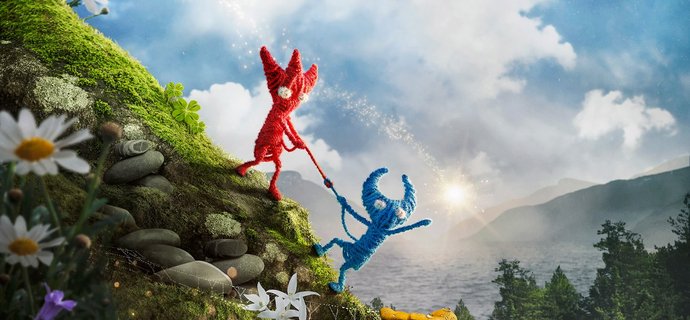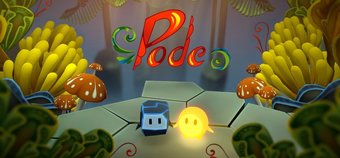Enemies. Why does it always have to be enemies? One of main reasons that the original Unravel was such a refreshing change of pace was because it almost entirely focused around brain teasing, physics based puzzles, with nary an enemy in sight. A tale of one small woolly boi coming up against a harsh and foreboding environment, the biggest foil you really faced was that of your own brain - if you couldn't figure out how to tie your woollen trail around the branches and logs in order to form the intricate pulley system you'd need to reach the next area, you were stumped. For Unravel 2, however, it seems "just" fiendishly tricky platforming sections and a requirement for split second reactions weren't enough on their own, as now, you'll need to dodge flipping annoying "one hit kill" enemies while you're doing it.
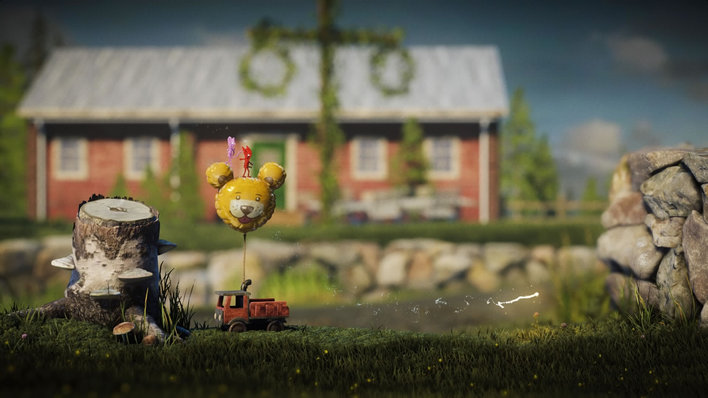
Luckily, that balloon isn't an enemy. We wouldn't have the heart to kill it if it was
Launched as a "surprise announcement" at E3, it wouldn't be entirely surprising if Unravel 2 had managed to fly under most people's radars so far, having decided to hit the digital stores at the exact same time everyone was looking the other way. Developed by small Swedish studio Coldwood - the same team that brought us the original - what you really need to know about Unravel 2 is that it offers plenty more physics based puzzles, some way too unforgiving "challenge" stages, and, perhaps most importantly, full support for two player, drop-in, drop-out local co-op.
If you know anything about us, you'll know that co-op usually adds at least half a star onto any game, as the only thing better than a good game is one that can be shared. Luckily, Unravel 2 is no different - although there are a few issues here with how things have been implemented.
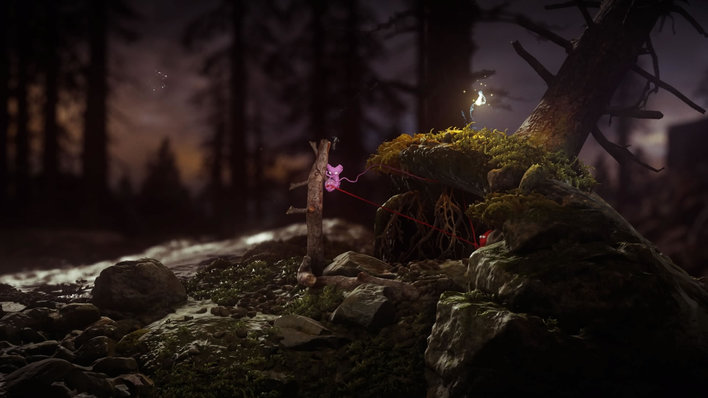
Lasso the stick and pull it upright to make a handy wall jump for your co-op partner. Job's a good 'un!
On the plus side, the game's new co-op premise removes one of the more irritating factors of the first game - the requirement to keep picking up new balls of wool as you went through the level. Rather than being tethered to some off-screen point just before the start of the level, now the two Yarnies are tied to each other, rather than the environment - so the only thing stopping you getting through the level is your own co-op partner. Or, in our case, the only thing getting you through the level is your co-op partner, as suddenly those platforming prat-falls aren't quite so dangerous.
Though it may seem like a small change, linking the two Yarnies together actually opens up a whole load of new platforming techniques - and many a way to work together in game's co-op puzzles. At its most basic, being attached to each other lets you use your friend as a kind of counterweight - with one player standing on a ledge, the other can lower themselves down and start swinging from the rope, to jump to the higher ground. In fact, many of the game's puzzles require you to work together with your co-op partner if you want to get past them - something which is great for those who have an extra player they can rope in, but which might leave those playing on their own a bit miffed, as they have to keep manually switching between the two Yarnies.
Regardless of whether you're on your own, or with a friend in co-op, though, Unravel 2 has a knack for forcing you to stop, and really think about almost every puzzle you find. Scouring the environment for clues, you'll always need to do a quick stock take to even try and figure out what you need to do next. Are there any glowing knots of wool, signalling something you can either swing from, or tie a bridge between? Is there anything movable, like a plank you can use as a see-saw, or a brick you can use as a counter weight? And is there anything interactive? Only after you've had a good look around will you be able to figure out what to do, as Unravel isn't exactly the kind of game you can just guess your way through. One of the first things you'll need to realise is that as you're tied together, your string can get wrapped around things - and that can often be key to solving the puzzles. Having to tie your collective string around a branch in order to swing over somewhere, or pull something to you would be easy enough - but often, you'll need to basically set yourself a path to follow to get back to the top. Take the puzzle below
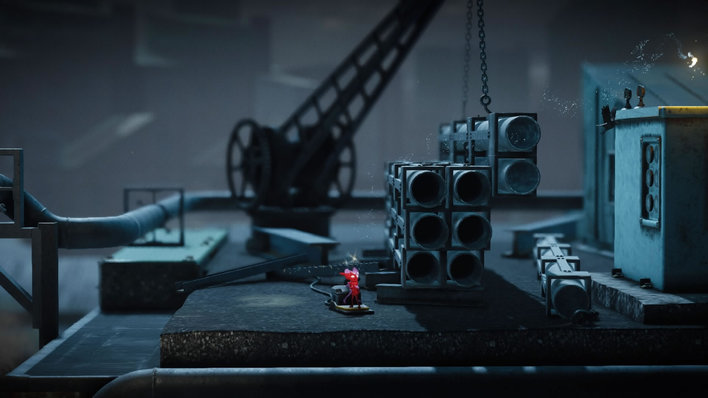
Pressing the switch (which we're both standing on) lifts the two pipes into the air. You need to get to the little glowing dot on the right - but you both need to get there in order to continue. That's easy enough for one of you - but if you step off the switch, the pipes will come crashing down, blocking the route for the second player. While you can usually squeeze the left trigger to pull yourself along the thread and towards your partner, that won't work here, as the thread's squashed beneath the weight of the pipes. So how do you get forward? Well, you go round.
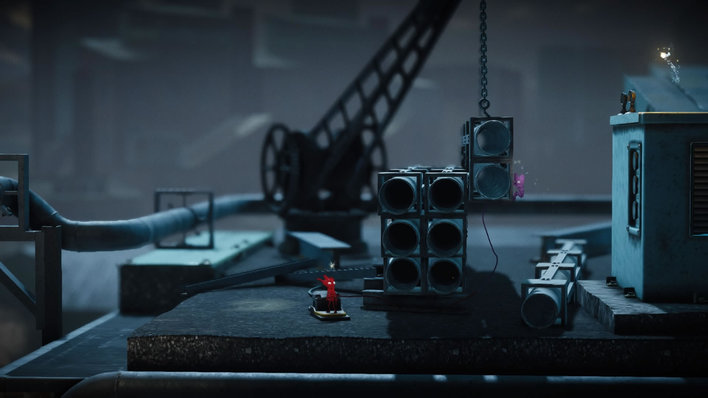
Rather than jumping straight up, the idea here is that the first player goes through, then you drop the pipes down. With the pipes on the ground, they can hop up on top, and then on to the stack of six, before dropping down to swap places with you on the switch, having essentially looped the rope over the top of the pipes. With your partner now standing on the switch to lift the pair of pipes up, you can go through and jump up to the roof of the thing on the right. Then all that's left is for your co-op partner to drop the pipes down, and pull themselves back up and over, following the string trail they've left.
Unravel 2 is full of puzzles like this that'll really make you stop and think, and consider how you'll need to use the very limited stuff you've got in order to get through. Though many seem impossible to begin with, as a fine Gentleman would say, every puzzle has an answer, and all you've got to do is put your mind to it to figure it out. One minute you'll be pulling up a twig to make a makeshift bridge for your partner, the next you'll be pushing a hosepipe around while your friend jumps up and down on a water pump to put out a fire. Time after time, Unravel 2 just keeps coming up with new ways for you to work together, and keeps your brain ticking over.

That's Sarah, miscalculating her swing as we lift the branch. Splosh.
However, it's not all good news for Unravel 2. Unfortunately, the game does take a rather unwanted turn towards "stupid hard indie game" territory at times, with the aforementioned introduction of enemies. Though the first game saw you being pecked at by birds, or snipped by unruly crabs, Unravel 2 introduces the much more irritating "flaming sparks" that chase you through levels, and which can seemingly accelerate towards you in the blink of an eye. Able to kill you in one hit, these add a not-at-all needed extra pressure to the game's platforming, as not only will you have to swing round like a loony thing - you'll have to adjust the timing (and sometimes, the length of thread you're swinging on for) your swing to make sure you don't crash into the irritating things that are homing in on you.
What's worse is that these enemies totally work against the co-op vibe. The sparks lie dormant until someone draws near, at which point they start to bear down upon you, homing in like a shark that's smelt blood. That means if one player is slightly ahead, the sparks will start moving - and by the time the second player catches up, the spark's in a perfect position to end their game. If one player dies, you both die, and it's back to the last checkpoint. Really, the only thing the addition of enemies has really done is to force you to make use of the "hitch a ride" function, where one player can merge with the other for getting past a particularly tricky section. Unravel 2 is tricky enough without enemies - and they add nothing to the gameplay, bar making it a much more frustrating experience for everyone involved.
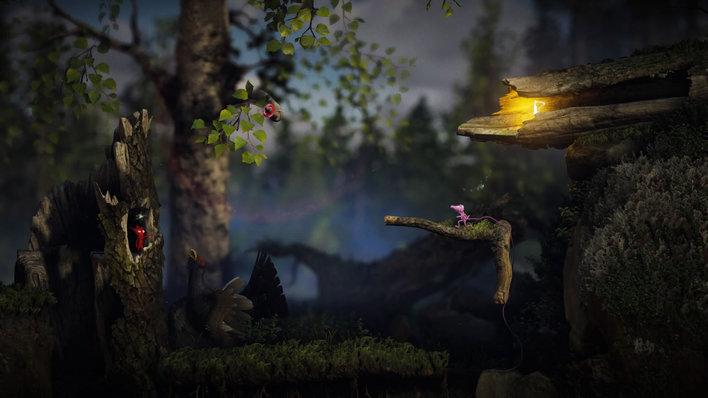
There are still some animal enemies to deal with too, but they're much less annoying. Here we are being harassed by a giant turkey. Where's Bernard Matthews when you need him?
Unfortunately, this "let's make a game that's as frustrating as possible" vibe follows into the game's bonus "challenge" stages. Each designed to really push your platforming skills to their limits, these bonus challenges are every bit as unforgiving as they are difficult. With a requirement for complete pixel perfect accuracy in every last one of your jumps, swings and leaps, these are much more frustrating than they are fun - if only due to the complete and utter lack of checkpoints. As such, completing half a dozen tricky jumps, and getting 90% of the way through the stage isn't enough - make one mistake, and you're back to the very beginning, and forced to start over again. No thanks.
It's a bit confusing, too, as this unfairly punishing attitude (not to mention the frustrating enemies) seem so out of place in a game like Unravel 2 - just as they did with Ori and the Blind Forest. With genuinely gorgeous graphics, a real "back to nature" feel, some proper brainteasing puzzles that'll make you stop and think, and the much welcome addition of co-op play, Unravel 2 has everything it needs to be a great, accessible, fun platformer. But the unneeded enemies prevent the co-op being as much fun as it should be; the frustrating challenge stages irritate more than they appeal, and the fact the game itself is a pricey £17.99 for just seven hours of gameplay (assuming you avoid most of the challenge stages), makes this one a real enigma in itself. There's a lot to like about Unravel 2 - but as a whole, it doesn't feel quite as polished, or as much fun as the original. If you like your co-op games, and you like puzzles, this is definitely worth picking up - but we'd wait for it to come round in the sale rather than plumping full price.
Format Reviewed: Playstation 4

